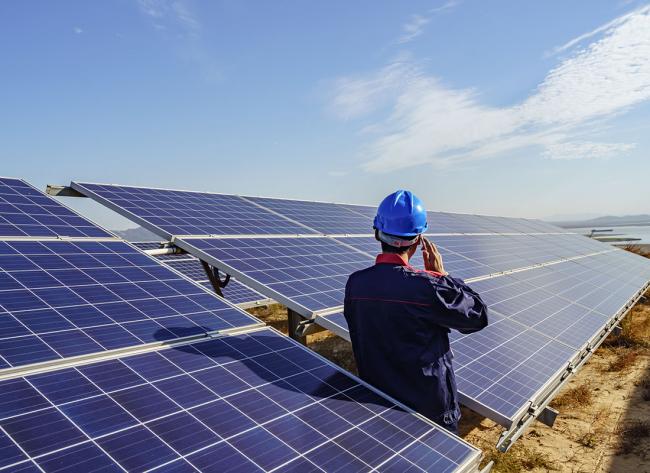The earth is unique. Why? There are lots of galaxies in the universe. There are lots of solar systems in one galaxy. Light from the sun takes over 8 minutes to reach the earth, yet this light is traveling at 185,871 miles per second! It’s this unique position to the sun that is key to life on earth. Let’s study our earth!
Exploring 4-H Exploring Your Environment
Exploring 4-H Exploring Your Environment Spark Activity: Water Cycle in a Bag
The sun provides the energy earth needs to survive and nothing is more important to life on earth than water. If water molecules didn’t behave the way they do, there would be no life on earth! The sun and water together do wonderful things in a cycle of movement. Let’s demonstrate some of these water cycle properties at home!
- Decorate the outside of a quart size resealable plastic bag with permanent marker to show the sun and clouds.
- Put a half cup of water (color with a drop or two of blue food coloring for fun) in your bag and close it tight!
- Place your bag in the freezer overnight. The next morning, hang your bag in a sunny window. Your liquid water has turned to a solid when below 32 degrees F. Note: solid water (ice) is less dense than liquid water and thus it floats. This insulates the liquid water beneath the ice allowing for aquatic life to live in cold weather! What if ice sunk to the bottom? Lakes would freeze solid! If that happened there would be no fish!
- Wait until late afternoon and look at your bag in the window. Solid water has turned liquid again. Some liquid water turned into a gas and rose up high in the bag. Now liquid water is clinging to the sides of the bag up high and bigger water droplets are “raining” back down! In this cycle you saw water in solid, liquid and gas forms. No water was lost, it just moved around!
4-H Project Levels and Goals
- Experiment with water, air, energy, and soils to understand their importance to earth
- Explore natural and man-made resources and how we affect them with our actions
- Discover how plant and animal life depends on a healthy environment
- Understand the uniqueness of planet Earth in the solar system
- Identify current environmental problems
- Learn about population capacities sustainability in ecology
- Discover the environmental importance of wind and solar energy
- Identify and solve a local environmental problem
- Explain the importance of reducing waste and recycling
- Demonstrate how the “greenhouse effect” can impact earth’s climate change Explain how earth’s ecosystem health can be scientifically measured
Put Your Project Into Action
Show Your Skills
- Explain the carbon cycle and how a tree is a great carbon storing organism
- Utilize a solar cell or model wind turbine to create an electrical circuit to perform a function
- Create a piece of artwork from recycled materials
- Re-purpose something being thrown away into a useful product
- Demonstrate stages of decomposition and composting
- Build a display that shows how slowing water flow reduces soil erosion and pollution in our rivers
Service and Leadership
- Contribute to Recycle Days at local Soil and Water Conservation Districts
- Write a letter to the editor or create a blog about an environmental issue that concerns you
- Ask a forest preserve or state park if they have a prescribed burn you can assist with and learn from
- Assist with a Conservation Day program with your school or park district
- Create a plan to reduce the waste and recycle in your school or community
Entrepreneurship
- Provide services or products that promote sustainability such as picking up leaf litter one year, then delivering compost the next
- Start trees from seed and sell and plant seedlings
- Make and sell art from recycled materials
Technology Connection
- GIS mapping computer science
- Weather station data collectors
- Renewable energy projects
- Build a solar-powered model car
Connecting with a Mentor
- Science teachers
- Conservation managers
- Conservation groups (watershed groups; wildlife habitat groups; bird watching clubs; etc.)
Events
- Earth Day
- Conservation Days
- Clean water celebrations
- Arbor Day
Careers

- Conservation Biologist
- Researcher
- Renewable Energy Technician/Engineer
- Nursery Owner
- Water Quality Engineer
- Environmental Lobbyist
- Soil and Water Conservation Manager
Start a Conversation
- The earth will never have more or less water than it does now, yet the human population continues to grow quickly on the planet earth. What do we need to do now to protect our future?
- How do the concepts of conservation and sustainability relate to your lifestyle today?
- Do you think these concepts will grow in importance or fade away in your lifetime?
- Do most youth ages 8-18 view good stewardship behaviors as a consumer (avoiding unnecessary plastic and Styrofoam packaging; recycling paper; etc.) as “cool” or “not cool”?
Credits
University of Illinois Extension staff that contributed to this resource include Curt Sinclair
4-H Spark Sheets are a collaborative effort of 4-H staff, volunteers, alumni and teens from across Illinois. A big thanks to the many contributors and reviewers!

